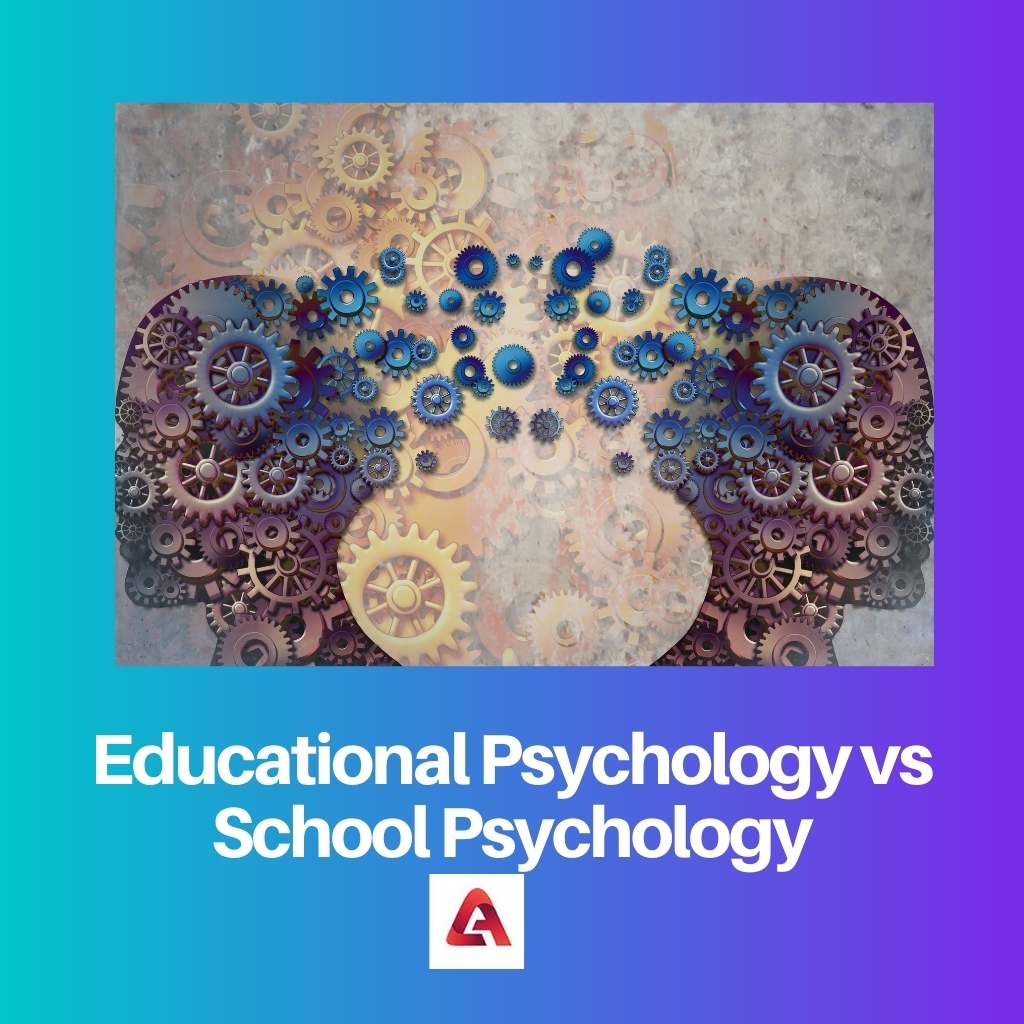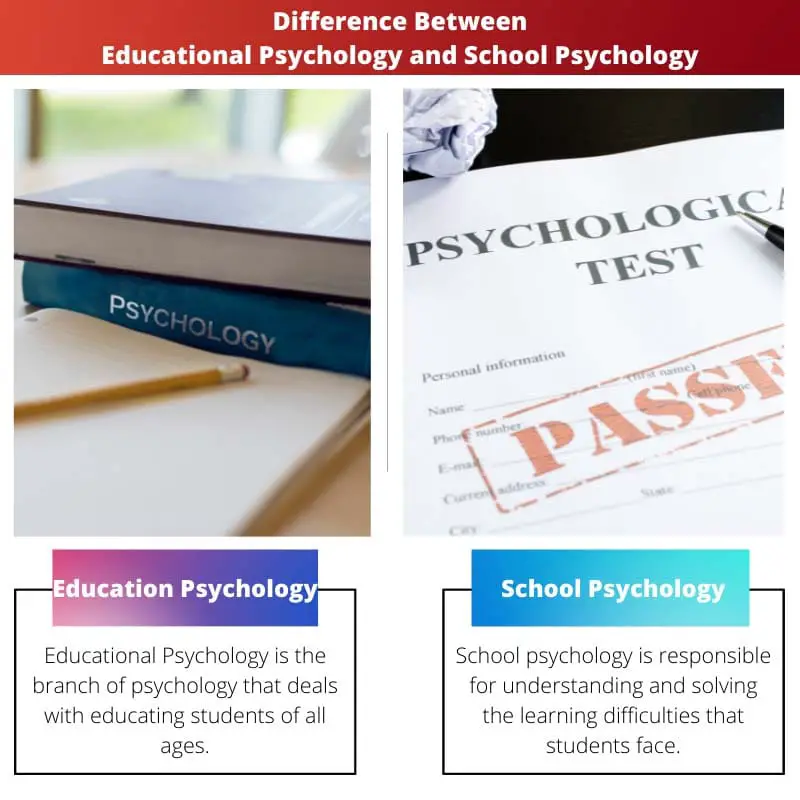Learning highly depends on the mindset and behavior of a person. Learning is a process of understanding a concept or a subject by reading through the materials and evaluating the material in mind.
Key Takeaways
- Educational psychology studies learning processes, teaching methods, and educational interventions across various age groups.
- School psychology specifically targets K-12 educational settings, helping students, educators, and families address learning, behavioral, and emotional challenges.
- Educational psychologists research to improve education, while school psychologists apply that knowledge directly in schools.
Educational Psychology vs School Psychology
The difference between Educational Psychology and School Psychology is that Educational Psychology is a study of behavior, and it works toward the psychology behind educating humans. School Psychology, on the other hand, is involved in solving the learning difficulties and dilemmas that children and adolescents face while learning something. Most of the time, these difficulties are related to the behavior of the student.

This field of psychology uses different approaches, such as a reward-feedback mechanism, to learn about the different ways in which a subject can be taught more effectively to students, making them more engaged in the subject.
School Psychology, on the other hand, is involved in solving students’ learning difficulties. Each student’s learning curve is different, and thus the pace at which different students grasp a topic also varies a lot.
Comparison Table
| Parameters of Comparison | Educational Psychology | School Psychology |
|---|---|---|
| Definition | Educational Psychology is the branch of psychology that deals with educating students of all ages. | School psychology is responsible for understanding and solving the learning difficulties that students face |
| Principles used | In educational psychology, qualitative and quantitative research methods are used to gather data and compute outcomes. | School psychology applies the principles of clinical psychology to solve the problems of individual students |
| Requirements | To become an Educational Psychologist, one must obtain a Master’s in Educational Psychology. | To become a school psychologist, one must have a Bachelor in Psychology |
| Approach | Studies conducted in Educational psychology are batch-wise and are conducted on groups of students. | Studies conducted in School psychology are on an individual basis |
| Outcomes | The results obtained by educational, psychological analysis help in creating more effective study materials and teaching techniques | The results obtained in clinical psychology of students in school help in understanding the behavioral patterns of students |
What is Educational Psychology?
Educational Psychology is the branch of psychology that deals with educating children, adolescents, grownups, and students of all ages. It aims to find out more effective ways of teaching.
The studies are conducted in groups, with a batch of subjects in each study. This helps in generating a diverse and richer dataset for researchers and psychologists to analyze.
The outcome of the experiments and tests conducted by Educational Psychologists helps schools and other educational institutions to make better study materials and books by understanding and eliminating the shortcomings in their teaching materials and techniques.
What is School Psychology?
School Psychology is the study of understanding the difficulties and problems that individual students face while studying and finding out solutions to these problems. Thus school psychology is a hands-on study that tries to deal with each student’s problems individually.
As it is a hands-on approach, the experiments, and other testing procedures are conducted on individual subjects. The results obtained are also related to the problems of the particular student rather than the entire class of students.
School psychology aims to solve the learning difficulties related to a particular student. Thus the outcomes obtained after psychological analysis pertain to the behavioral patterns of that particular student. With a hands-on approach to students’ problems, a deep insight into the student’s social behavior can be obtained, which can then be efficiently treated.
Main Differences Between Educational Psychology and School Psychology
- Batch studies are conducted in Educational Psychology. School Psychology is a hands-on approach.
- The results obtained from Educational Psychology tests help schools and universities prepare better study material for students. School Psychology tests provide insight into the behavioral patterns of individual students.

The main differences between educational psychology and school psychology are articulated clearly. A highly insightful piece!
Absolutely, the article serves as an excellent resource for those seeking a deeper understanding of these psychological domains.
Indeed, the article succeeds in delivering a comprehensive breakdown of the core disparities between educational psychology and school psychology.
A thorough and intellectually stimulating piece on the distinctions between educational psychology and school psychology. Well-executed content!
I couldn’t agree more. The depth of analysis in this article provides a commendable insight into the complexities of these psychological disciplines.
Very informative article! The difference between educational psychology and school psychology has been clearly explained.
Yes, this article has done a great job in highlighting the key aspects of both educational and school psychology.
This article has given a comprehensive comparison between educational psychology and school psychology. Thank you for sharing!
Absolutely, the detailed comparison in this article is very helpful for understanding the differences between the two fields.
An enlightening and comprehensive exploration of the differences between educational psychology and school psychology. Kudos to the author for the depth of research and clarity of presentation!
I appreciate the detailed information provided, especially the section on parameters of comparison. The learning outcomes from educational psychology and school psychology are now clearer to me.
Yes, the article breaks down the outcomes of both fields effectively, allowing for a better understanding of the differences.
The comparison table has made it easier to grasp the fundamental disparities between educational psychology and school psychology. Great content!
I found the section on ‘What is Educational Psychology’ and ‘What is School Psychology’ particularly intriguing. The hands-on approach in school psychology is indeed a significant point of difference.
Agreed, the hands-on approach of school psychology brings a valuable insight into individual students’ learning difficulties.
The article has effectively emphasized the distinct differences in methodology and focus between educational psychology and school psychology. A great read!
Absolutely, the comparison table makes it easier to grasp the nuances of each field.
The depth of analysis in this article is commendable, shedding light on the unique contributions of both educational and school psychology.